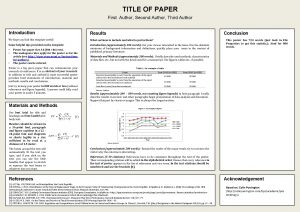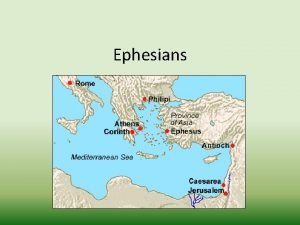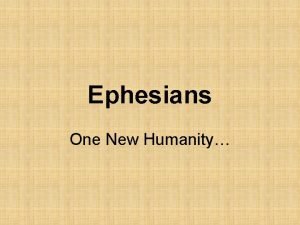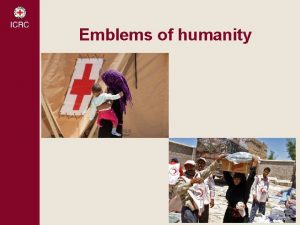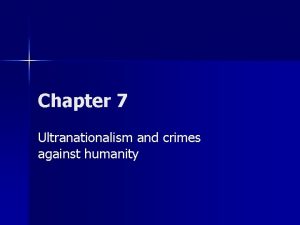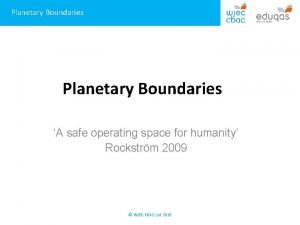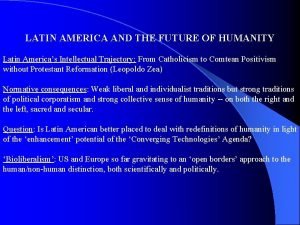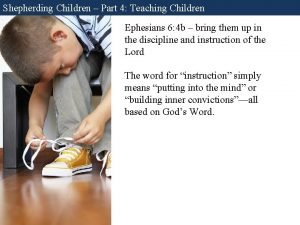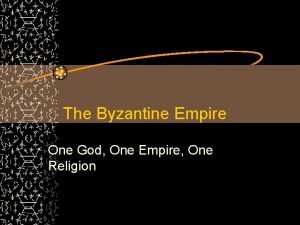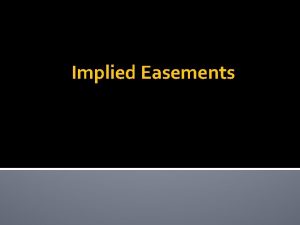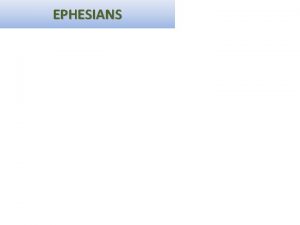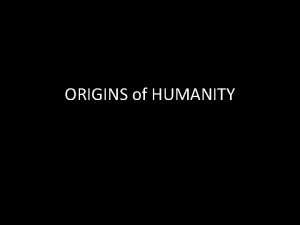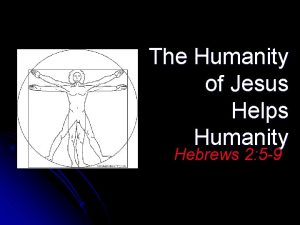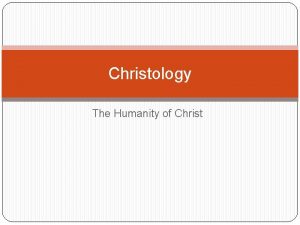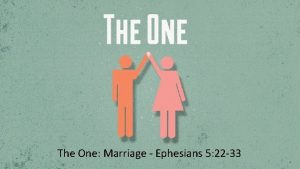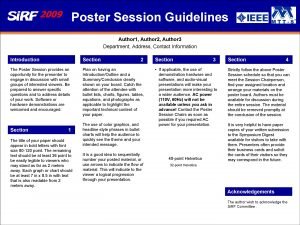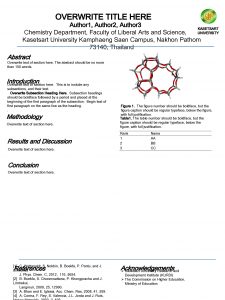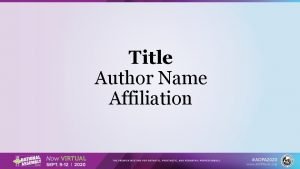Ephesians One New Humanity Ephesians Author Implied author























- Slides: 23

Ephesians One New Humanity…

Ephesians • Author… – Implied author of text is surely Paul • “Paul, an apostle of Christ Jesus by the will of God” (1: 1) • “This is the reason that I Paul am a prisoner for Christ Jesus for the sake of you Gentiles—for surely you have heard of the commission of God’s grace that was given me for you, and how the mystery was made known to me by revelation…” (3: 1 -3) • “Although I am the very least of all the saints, this grace was given to me to bring to the Gentiles the news of the boundless riches of Christ…”(3: 8) • “Pray also for me, so that when I speak, a message may be given to me to make known with boldness the mystery of the gospel, for which I am an ambassador in chains. Pray that I may declare it boldly, as I must speak. ” (6: 19 -20)

Ephesians • Author… – But is Paul really the author? • Ephesians falls into the “disputed” category of Paul’s letters because so many contemporary scholars question whether it was Paul who wrote this letter. • If the letter presents itself as coming from Paul, why would anyone question this attribution? • There a number of reasons, but let’s begin with the one that is most clearly evident—Ephesians appears to be “plagiarizing” the letter of Colossians (no moral judgment is implied here—”plagiarism” in ancient and some modern cultures is a compliment, not a crime)

Ephesians • Author… – But is Paul really the author? • Ephesians falls into the “disputed” category of Paul’s letters because so many contemporary scholars question whether it was Paul who wrote this letter. • If the letter presents itself as coming from Paul, why would anyone question this attribution? • There a number of reasons, but let’s begin with the one that is most clearly evident—Ephesians appears to be “plagiarizing” the letter of Colossians (no moral judgment is implied here—”plagiarism” in ancient and some modern cultures is a compliment, not a crime) • Take a look at the handout comparing Colossians and Ephesians in terms of overlapping subject matter

Ephesians • Author… – Ephesians copies Colossians? • • 1570 words in Colossians— 34% appear in Ephesians 2411 words in Ephesians— 26. 5 % appear in Colossians 29 word verbatim agreement: Eph 6: 21 -22 and Col 4: 7 -8 7 word verbatim agreement: Eph 1: 1, 2 and Col 1: 1, 2; Eph 3: 2 and Col 1: 25; Eph 3: 9 and Col 1: 26 • 5 word verbatim agreement: Eph 1: 7 and Col 1: 14; Eph 4: 16 and Col 2: 19 – Can best be explained either by one copying another, both copying a common third letter or outline • The exact verbal parallels speak against simply following a common outline and adding a third letter simply adds unnecessary complexity • Hence, one copying the other, and here more scholars conclude Ephesians shows signs of being the later letter.

Ephesians • Author… – So that raises the intriguing question, if Paul is the author of both, why is he copying himself? – Add to this the nearly universal observation by scholars that Ephesians has a somewhat different style, pace, and at times vocabulary and perhaps even theology than other most definitely Pauline letters • No apparent focus on a real problem or situation which called for a letter • More “grand theologizing” than typically seen in his other letters • Emphasis more on “Church” than “Christ”

Ephesians • Author… – Hence three theories of authorship proposed to account for these qualities in Ephesians • 1. ) Paul is writing this late in his career and life and writing a more general “Pauline” theology as a sort of legacy or to summarize his thoughts for the situation the church finds itself near the end of his ministry; he does this general circular letter at the same time as he writes a more specific letter to address particular issues in Colossae (hence sending both by Tychicus; hence the similarity between the two) • 2. ) Paul has left the writing of this letter to a junior colleague who writes it up based on Paul’s letter to the Colossians (and perhaps it is written by the same person also writing Colossians), i. e. , Paul has ghost writers in his entourage later in his career • 3. ) One of Paul’s students has taken it upon himself to write up another Pauline letter summarizing and applying Paul’s teaching for the post-Pauline church, using the formula of a Pauline letter to do it – Either intentionally trying to pass off a forgery, or… – Using the ancient practice of pseudonymity—where you write in the name and style of a famous person but your readers understand it is an authorial persona, not the actual writer

Ephesians • Author… – All three theories have scholarly arguments in their favour – I personally am more convinced by #2 and #3 than by #1 • The differences in style, tone, and content are dramatic enough that a “late in life” scenario does not really carry weight • The arguments in favour of #1 are constantly undermined by special pleading for why there are so many exceptions to what Paul does and says in other letters accepted as genuine.

Ephesians • Author… – Choosing between #2 and #3 • Much depends on whether you see Ephesians reflecting a relatively later church situation and how much latitude you imagine Paul would give to someone in his entourage writing letters on his behalf. • Emphasis on founding apostles and prophets (e. g. , 2: 20, 3: 5), the transition from egalitarianism (e. g. , Gal 3: 28) to patriarchal household code (e. g. , 5: 21 -6: 9) and a shift to church and realized eschatology rather than Christ and immanent parousia are all seen as indicators of much later church context (i. e. , 80’s or later rather than 60’s). Hence, #3. • But if you take personal references at face value rather than as literary device, #2 works better and you could argue (as I would) that evolutionary models of early church development are too slow (i. e. , institutionalization and shift to stable church life vs. millenarian fever can happen much quicker sociologically speaking). • My best guess--#3 may have slight advantage but I would not discount #2.

Ephesians • Author… – Choosing between #2 and #3 • Much depends on whether you see Ephesians reflecting a relatively later church situation and how much latitude you imagine Paul would give to someone in his entourage writing letters on his behalf. • Emphasis on founding apostles and prophets (e. g. , 2: 20, 3: 5), the transition from egalitarianism (e. g. , Gal 3: 28) to patriarchal household code (e. g. , 5: 21 -6: 9) and a shift to church and realized eschatology rather than Christ and immanent parousia are all seen as indicators of much later church context (i. e. , 80’s or later rather than 60’s). Hence, #3. • But if you take personal references at face value rather than as literary device, #2 works better and you could argue (as I would) that evolutionary models of early church development are too slow (i. e. , institutionalization and shift to stable church life vs. millenarian fever can happen much quicker sociologically speaking). • My best guess--#3 may have slight advantage but I would not discount #2.

Ephesians • Who was it written to? – Two complicating factors • Who wrote it? – If Paul or assistant in his lifetime and sent by Tychicus, it would have been headed to same region as Colossae, namely Asia Minor – If later copy of Colossians letter by pseudonymous author, then any place or no place in particular is possible • Textual variants in 1: 1 – “in Ephesus” does not appear in some key ancient manuscripts – However, “to the saints who are also faithful in Christ” is a bit awkward – Lincoln (and others) have suggested an original twofold destination “to the saints [in x] and the faithful [in y]”.

Ephesians • Who was it written to? – The problem with Ephesus as the destination if this is either Pauline, Pauline commissioned or Pseudo. Pauline is the letter appears to imply the recipients do not necessarily have personal knowledge of Paul and his ministry nor does the author seem to presume first hand knowledge of his audience (e. g. , 1: 15, 3: 2) whereas both Paul’s genuine letters and Acts speak of considerable time spent in Ephesus. – I would argue that given its general nature, whether Pauline or post-Pauline, a more generic letter probably indicates a widespread intended readership, but if a location has to be determined, there are hints that Asia Minor (also the location of Colossae) is probably the best choice.

Ephesians • Who was it written to? – Some scholars argue that there are specific social and religious conditions in Western Asia Minor that are reflected in the letter’s content • Roman power brought the Eastern Hellenistic world an external political and economic unity but individuals in this environment had lost social integration and a sense of belonging. In the more crowded cities people felt uprooted and alienated and old traditions, including religious traditions, were inadequate. Instead of being well ordered, the cosmos was perceived as hostile and inhabited by malevolent spiritual forces. In this religious milieu you had a rise of new religious movements and syncretism. A sort of monotheism arose, one God in heaven just like one emperor on earth—but like the distant emperor, so the one God was equally distant. In this universe salvation was found in escaping from this world to the upper realms of the cosmos. A religious context such as this was fertile breeding ground for mystery religions and magical rites which offered protection for malevolent spiritual forces and offered ascent forms of salvation while also speculating on the nature of the cosmos. Some such religious syncretism is frequently seen lurking behind the letter to the Colossians and Ephesus had a reputation as a great centre for magic in the ancient world. (See Lincoln, Ephesians) • This is possible, but other scholars argue that much of the teaching of Ephesians is equally plausible as a natural extension and development of Pauline theology in a post-Pauline context rather than being so context specific. (this is Lincoln’s preferred position, Ephesians)

Ephesians • Why was it written to? – Again, answering the “who wrote” and “to whom written” will determine this in part – A much more general letter and so typical mirror reading techniques that work so well in the Corinthian letters or Galatians are not as useful here – The “why written” ends up being merely a summary of the more general theological and ethical contents of the letter, i. e. , people needed to hear the message and encouragement presented in Ephesians

Ephesians • See for example Lincoln’s summation: – “…the letter was intended to reinforce its readers’ identity as participants in the Church and to underline their distinctive role and conduct in the world. In reminding the readers of their identity and roots, the writer tells them that they are part of a universal Church, one new humanity out of Jew and Gentile. They owe this status, in large part, to Paul and his insight into the gospel. But the movement of which they are a part is not just another new cult. It is linked with God’s previous working within Israel and is a decisive stage in the completion of his purposes in Christ. Indeed, ultimately it is rooted in his electing purposes from before the foundation of the world. The Church of which the readers are members is not just one among a number of competing movements. Through their relationship with Christ they are in touch with the God who is the Creator of the whole cosmos and whose plan of salvation includes that cosmos and its harmony in Christ. In fact, the salvation they have already experienced is an essential part of the outworking of that plan, and what has been accomplished in the Church’s unity is an anticipation and pledge of final cosmic unity. The readers are to be proud of such an identity and such a calling and are to live them out. They are to have an awareness of God’s global or cosmic purposes, but are then to act locally in a way that is appropriate to this unique community’s role in the world. They should not, therefore, simply accommodate themselves to surrounding values. Instead, the writer sets out some of the ethical distinguishing marks of the new humanity God has created in Christ and indicates that, as his readers embody these, they will discover that their life in their community illuminates some of the surrounding darkness. ” (Lincoln, Ephesians)

Ephesians • Prominent themes in Ephesus – Emphasis on already achieved salvation (“realized eschatology”) – Emphasis on Christ as already ruling in heavenly realm – Emphasis on the individual’s and Church’s participation and identification with the risen, exalted, ruling, heavenly Christ (rather than emphasis on crucified, suffering Christ—as per, say, Romans 6) – Extensive teaching on lifestyle and household conduct

Ephesians • If this represents classic Pauline eschatology, Ephesians offers a theology that emphasizes “the age to come” – “God has put this power to work in Christ when he raised him from the dead and seated him at his right hand in the heavenly places, far above all rule and authority and power and dominion, and above every name that is named, not only in this age but also in the age to come” (1: 20 -21) • Some scholars speak of Ephesians as having a “realized eschatology” but that is overstating it—there is still a future component in Ephesian’s picture of Christ’s work, even it is nearly overshadowed by the dominant picture of Christ’s present rule in the heavenly realm. (e. g. , 1: 14)

Ephesians • Emphasis on Church and Individual identified with risen, exalted, and ruling Christ; Church is headed and filled by the victorious ruling Christ. – E. g. , “And he has put all things under his feet and has made him [Christ] the head over al things for the church, which is his body, the fullness of him [Christ] who fills all in all” (1: 22) – E. g. , “But God…. made us alive together with Christ—by grace you have been saved—and raised us up with him and seated us with him in the heavenly places in Christ Jesus…” (2: 4 -6) – E. g. , Speaking of the church the writer says, “In him the whole structure is joined together and grows into a holy temple in the Lord; in whom you also are built together spiritually into a dwelling place for God” (2: 21 -22). – E. g. , “so that through the church the wisdom of God in its rich variety might now be made known to the rulers and authorities in the heavenly places” (3: 10).

Ephesians • Very extensive teaching on living “Christian life” —morality and ethics, including a “household code”, and prayer – Writer sees the victorious life in which the church and its believers are identified with the exalted cosmic Christ as needing to be expressed in terms of faith community, family life and spiritual struggle. • Unity of Christians (4: 1 -16) • Giving up immoral practices associated with pre-Christian pagan lifestyle (4: !7 -5: 20) • “Household Code” offers instruction on living with husbandwife, parent-child, master-slave relationships (5: 21 -6: 9) • Emphasis on prayer in the spiritual battle (6: 10 -20)

Ephesians • “Household Code”—distinct to Colossians and Ephesians – Most likely Ephesians version copied from Colossians – Many scholars assume the code is borrowing from existing Greco. Roman versions of household codes but with a “Christian gloss” added – The codes can be read as an attempt to ensure mainstream “respectability” of the Christian community within an increasingly hostile Greco-Roman environment. – Are read by some scholars, especially those influenced by feminist reading strategies, as a sell out of the church to patriarchy of Greco. Roman culture from its original egalitarianism – It certainly only makes sense in terms of speaking to (and perhaps out of) a classic ancient patriarchal authority structure, however there are two possible responses to this particular feminist critique. • One could apply an even more rigorous feminist critique and argue that original egalitarianism in Pauline Christianity is itself a utopian myth by contemporary Christian feminist scholars, i. e. , the household code gives away the patriarchal structure that was there from the beginning since Christianity is born in a patriarchal society • One could argue that these texts are the first steps out of patriarchal authority structures—namely, in each case of the dominant figure in the binary pairs it is the party with the power to change the relationship that is called to do so (husband, father, master); furthermore, “submission” is the task of all believers as per 5: 21.

Ephesians • Is there one unifying theme to the epistle? – Any time you reduce a book to one theme it says as much about the interpreter as the book…but here is my best effort anyway… – I chose “One New Humanity” on the opening slide – This is inspired by what I regard as the climax of Paul’s opening “theological treatise” 2: 11 -22 and especially 2: 15 -17 • “He has abolished the law with its commandments and ordinances, that he might create in himself one new humanity in place of the two, thus making peace, and might reconcile both groups to God in one body through the cross, thus putting to death that hostility throu it. So he came and proclaimed peace to you who were far off and peace to those who were near; for through him both of us have access in one Spirit to the Father”

Ephesians • Is there one unifying theme to the epistle? – This theme of “one new humanity” is signaled right from the start with his language of God having planned to have a people he would save from “before the foundations of the earth” (1: 4; 1: 314); God’s mercy expressed in Christ who creates this humanity in his saving resurrection (1: 15 -2: 10); it has motivated Paul’s apostolic ministry (3: 1 -21); and it must find expression both in the church’s worship and corporate life (4: 1 -5: 20); within the Christian’s household (5: 21 -6: 9); and it will win and stand firm until the end through God’s protection (6: 10 -20). – If expressed theologically so powerfully in 2: 11 -22, it is expressed ethically in 4: 1 -6. • “…lead a life worthy of the calling to which you have been called, with all humility and gentleness, with patience, bearing with one another in love, making every effort to maintain the unity of the Spirit in the bond of peace. There is one body and one Spirit, just as you were called ot the one hope of your calling, one Lord, one faith, one baptism, one God and Father of all, who is above all and through all and in all. ”

Ephesians • Any specific questions on content?
 First author second author third author
First author second author third author Author of ephesians
Author of ephesians Author of ephesians
Author of ephesians Humanity poem by elma stuckey
Humanity poem by elma stuckey The first emblem of humanity
The first emblem of humanity How does ultranationalism lead to crimes against humanity
How does ultranationalism lead to crimes against humanity A safe operating space for humanity
A safe operating space for humanity Advancing technology for humanity
Advancing technology for humanity Human values.
Human values. Humanity chapter 4
Humanity chapter 4 Habitat for humanity restore yakima
Habitat for humanity restore yakima Advancing technology for humanity
Advancing technology for humanity How to serve humanity
How to serve humanity About humanity
About humanity Together for humanity
Together for humanity Humanity in latin
Humanity in latin Humanity paragraph
Humanity paragraph Gods plan for humanity
Gods plan for humanity Habitat for humanity poland
Habitat for humanity poland Shepherding humanity
Shepherding humanity Mondragon humanity at work
Mondragon humanity at work Advancing technology for humanity
Advancing technology for humanity Piedmont habitat for humanity
Piedmont habitat for humanity One god one empire one religion
One god one empire one religion
